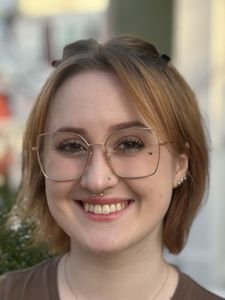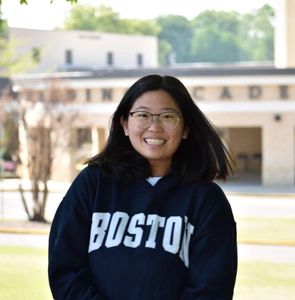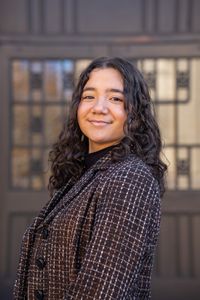Research for Good
CGS’ Social Impact Research Fund allows students to create projects that will make a difference
By Chelsea Feinstein

Undergraduate research experiences have long been a hallmark of CGS, with the college’s Center for Interdisciplinary Teaching & Learning (CITL) supporting more than 50 projects each year.
Through CITL’s Social Impact Research Fund (SIRF), students who have completed a CGS undergraduate research experience are able to devise their own research projects with the support of a faculty mentor.
SIRF was established by Gary A. Kraut (’64, COM’66) to give students the resources they need to implement projects that strive to make a positive impact on society. Recipients are awarded grants of $6,000 over two semesters, plus supply costs, to put their ideas into action.
Three students have received SIRF awards for the 2024–2025 academic year.
Veronica Gates: The Environmental Impacts of BU’s Lobster Night

Lobster Night is a tradition at BU. But for Veronica Gates, the annual event raises several ethical questions around overconsumption, the morality of cooking animals alive, and waste from lobsters that go uneaten. For her SIRF project, Gates (’24, CAS’27) is exploring ways to improve the sustainability of Lobster Night, including reducing waste.
Gates, whose faculty mentor is Kari Lavalli, a master lecturer and chair of the natural sciences and mathematics division, is working to connect with BU Dining and the University’s lobster supplier, surveying students for their opinions on Lobster Night and possible changes to it, and drafting a paper proposing possible sustainable solutions and ways of educating the BU community on lobster welfare.
Gates previously worked on an undergraduate research project at CGS, studying antibiotic-resistant bacteria in the Charles River. She says that project prepared her to direct her own research with the help of the SIRF grant.
“It can feel incredibly daunting,” Gates says, “but I think this self-directed project will have a tremendous impact on my readiness for a career as a biologist. Working in a lab and researching for my project both really solidified that I want to be a biologist, and I don’t think I would be as confident about my career had I not done research projects like these.”
Jessica Lee: Using Visuals to Combat Language Barriers in Mental Health Care

Jessica Lee’s SIRF project developed out of previous research she’d done alongside Davida Pines, a CGS associate dean and director of CITL, on aging in graphic medicine, the use of comics in medical education and patient care. This work piqued Lee’s interest in the power of graphics to bridge the language barrier between patients and providers, an idea bolstered by her own experiences with family and a stint volunteering at the Gwangju Migrant Health Center in South Korea last year.
“With my family being immigrants from Korea without any English fluency, I have experienced first-hand how they struggle communicating with healthcare providers, even with interpreters,” says Lee (’24, CAS’25). She points to a recent incident involving her grandmother, who didn’t understand that she wasn’t supposed to eat or drink eight hours before cataract surgery. As a result, she had to have the procedure without general anesthesia.
As part of her project, Lee is also working with a doctor at the Immigrant and Refugee Health Center at Boston Medical Center—BU’s primary teaching hospital—to implement her recommendations for graphics to help overcome language barriers.
Lee credits Pines’ mentorship for helping her build the confidence to lead her own research project.
“I have gained a tremendous amount of research skills, learning how to ask and answer critical, effective questions to research efficiently,” she says. “Ultimately, I hope to increase awareness of the impact of graphics that can be used in the healthcare field to better care for patients.”
Camila Olivo: Migration as a Humanitarian Issue

Camila Olivo had the idea to organize a forum about immigration as a humanitarian issue after completing a summer internship at Catholic Charities of Central Florida Immigration Legal Services in her hometown of Orlando, Fla.
“I saw a discrepancy between how the immigration question is considered by politicians and the general public versus in an immigration office,” she says, noting that while she often sees the news portrays immigration as a strictly political issue, immigrants were recognized for their humanity and treated with compassion in the office where she worked. “I witnessed an arduous documentation process that those who work in this sort of office are all too aware of, yet is hardly ever acknowledged in public political discourse. Because of this, I wanted to bring the struggles of the legal immigrant to life. SIRF has provided me with the opportunity to do just that.”
Olivo (’23, Pardee’25, CAS’25) plans for her project to culminate in the forum, to take place on the BU campus this spring. Working with Michael Holm, a senior lecturer and chair of CGS’ social sciences division, she will compile insights from the symposium into a comprehensive report.
“Before coming to college, I never considered doing research, let alone leading my own project,” Olivo says. “I am grateful for SIRF, because it has provided me with a special opportunity to create a project, and potentially contribute to a solution, focused on an issue that I have seen in the world and in my chosen field of study. This is the unique attribute of a project like SIRF—it invites and encourages students to create a research project rather than to just do research.”